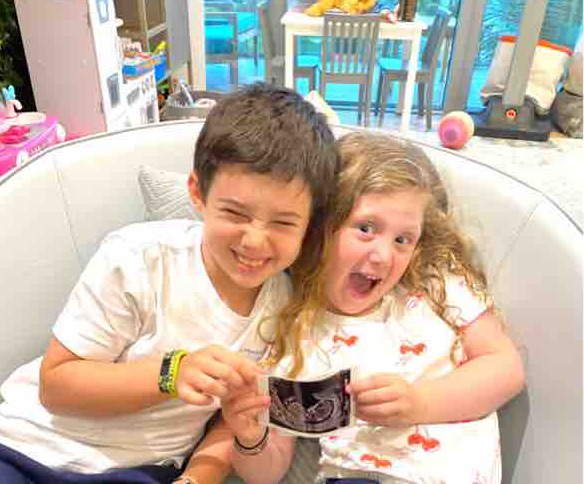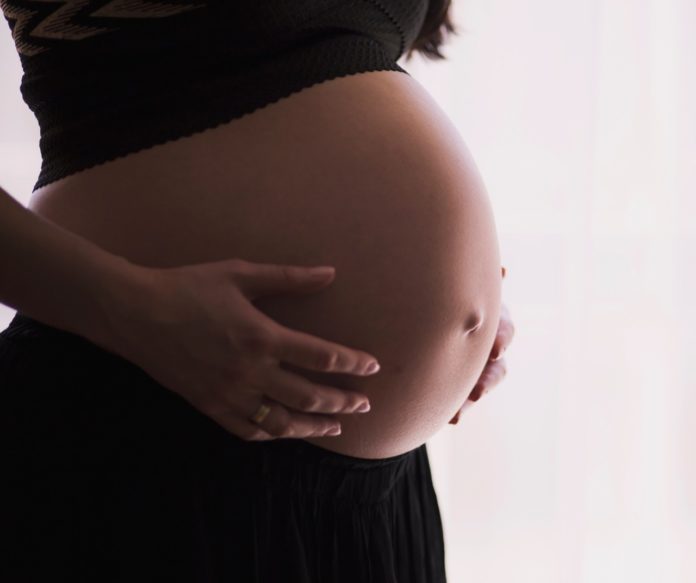Pregnancy is a transformative rollercoaster ride of emotions — it’s undoubtedly one of the most physically and emotionally exhausting experiences of a woman’s life. From the moment you find out you’re going to be a parent to the moment you finally get to hold that tiny nugget in your arms (and all the moments that follow), the world becomes a very beautiful, confusing and often overwhelming place. Even during normal, drama-free times pregnancy comes with its fair share of emotions, fear, and doubt. And that’s during stable, healthy, average days when prenatal appointments, gender reveals, baby showers, and having your partner by your side during ultrasounds and delivery are a guarantee.
But these are not normal times. These are global pandemic times, and while almost every aspect of our lives has been abruptly altered, disrupted and turned completely upside down, navigating pregnancy during a global crisis adds a whole other layer of complications to an already complicated reality.
And that’s the reality I’m currently faced with.
I’m currently five months pregnant with my third child, making me what some might call a pregnancy pro (not me, but some people, who have clearly never been pregnant before), and yet I find myself trying to find my way through totally uncharted territory.

I’ve never tried growing a human being while simultaneously worrying about my own health, the health of my children (living and not yet born), the well-being of my loved ones, and the health of my community. I’ve never had to go through pregnancy without my husband sitting next to me during ultrasounds and blood tests. I’ve never scheduled my regular checkups as telemedicine appointments where I try to take my own pulse. I’ve never been terrified to leave my house or been unable to see my family and friends as my belly grows daily. It seems that my unborn child is completely oblivious to the fact that time seems to be standing still across the globe, because inside my womb time marches on without a pause.
I’ve never had to put on a brave face for my kids while also juggling the laundry list of fears running through my head as our country and our world fight to manage this dangerous virus — a virus that doesn’t seem to be threatening pregnant women or babies any more than other patients, but a virus that we still know so little about.
But here we are.
If you’re out there, you’re pregnant and terrified, you’re confused and lost, you’re overloaded with questions and underwhelmed by the answers (or lack of information) and you’re feeling alone, rest assured: YOU ARE NOT ALONE. In fact, you’re probably the least alone you’ll ever be. You’re carrying another human being inside if you, so by definition you’re in constant company. And you’re doing it alongside — in spirit and solidarity — communities of other mothers and pregnant women from all corners of the earth. We’re in this together.
If you’re anything like me, you don’t know what to think. But you’re almost definitely thinking one or more of the following:
Is my baby safe? Am I safe? Am I at an elevated risk of contracting COVID-19? What are the risks to my fetus? Will I have to deliver my baby alone, without my partner? Will I be able to hold my baby? Will I be safe in the hospital? Will my family be able to meet the baby and support me after the birth?
And if you’re not yet pregnant, but you’re trying to conceive, you probably have questions of your own:
Is it safe to get pregnant during the pandemic? Is it safe to go to doctors’ offices for reproductive tests? Should we wait until the world is safer? If I get COVID-19 and get pregnant can I pass on the virus to my fetus? Is it a bad idea to overwhelm an already overwhelmed healthcare system by getting pregnant during a pandemic?
So, let’s get down to the really pressing issues. Because I’m willing to guess that whether this is your first pregnancy, your third, your fifth, or your last, you’re feeling extremely suffocated by the reports, false rumors, and scary truths flooding your news feeds.
I am by no means an expert — I can say with certainty that this pregnancy is nothing like my last two and I can only hope it will be nothing like pregnancies for future generations of moms — but I am most definitely a neurotic mom of two who stays awake at night researching and investigating and asking all the questions we’re all wondering.

Is It Safe to Be Pregnant During COVID-19?
According to current, available information from the CDC, which is obviously changing moment to moment and evolving daily, pregnant people seem to have the same level of risk as adults who are not pregnant. Which means that no, pregnant women are not at an elevated risk of contracting COVID-19 compared to an average adult. We also know that it does not seem as if a pregnant woman who does have COVID-19 can transfer the virus to her fetus either in utero or during childbirth.
According to a recent report from L.A. County officials, in a county that has recorded more than 32,000 confirmed cases of COVID-19 and upwards of 1,500 deaths, they found that of 134 pregnant women who tested positive for the virus, none of those women seemed to pass on the virus to their infants. Of those 134 women, there have been 29 live births and one stillbirth, and of the 24 infants who were tested at birth, NONE of them tested positive for the virus, according to Public Health Director Barbara Ferrer. So, based on these results it seems that it is unlikely for a pregnant mother to pass the virus to her baby during pregnancy or childbirth.
Go ahead, breathe a huge sigh of relief.
But here’s the tricky thing… while this news certainly seems like good news, it’s also premature news that provides as much confusion as comfort. Experts agree that it’s far too early for researchers to really know how COVID-19 might affect a fetus both in utero and during childbirth.
“We are operating in a data-free zone,” explains Yalda Afshar, an OB-GYN at UCLA Health in Los Angeles. “People are appropriately scared because when we can’t counsel them with good evidence-backed data the unknowns are very intimidating,” she tells The Washington Post.
In some cases, while rare, pregnant women are delivering prematurely, and while the American College of Obstetricians and Gynecologists notes that it’s unclear whether the premature birth is directly linked to or caused by COVID-19, it’s also not impossible. In other situations, pregnant women are being placed into medically induced comas and giving birth via Cesarean-section in an effort to protect the fetus. Just last month, new mom Angela Primachenko gave birth to her daughter at only 34 weeks pregnant, while in a medically induced coma and hooked up to a ventilator as she battled the coronavirus. Several weeks later she was awake and finally healthy enough to hold her newborn baby for the first time.
In New York, Brooklyn mother LaToya Jordan gave birth at 38 weeks pregnant, without her husband by her side. And because she tested positive for COVID-19, she was unable to hold her newborn baby until three days later, while wearing a mask to protect the baby, who luckily tested negative. She recalls the experience as being emotionally draining, and encourages all pregnant women to gather as much information as possible. “There were moments when I was overly compliant,” Jordan told CBS New York. “I would say to arm yourself with information, be fierce enough to push back and ask questions.”
Yes, it’s true that these cases are rare, but they are happening across the country, and as a pregnant woman who herself is in the thick of it, I can tell you that the fear is real.
Another potential risk — key word being potential — is that pregnant women might be more susceptible to severe cases of respiratory illnesses, including COVID-19. We know that pregnant women have suppressed immune systems generally speaking, which can impact the way our bodies fight off a wide range of illnesses, such as influenza and, shocker, the coronavirus. Some experts believe that pregnant women hospitalized for critical cases of respiratory illnesses may be at greater risk of pregnancy complications. Think about it. If you are unable to get enough oxygen because of respiratory issues and trouble breathing, then you’re definitely not taking in enough oxygen to support your baby.
That said, a recent study published in the American Journal of Obstetrics & Gynecology MFM found that “COVID-19 disease severity in pregnant women—86% mild, 9.3% severe, and 4.7% critical—appears similar to that in nonpregnant adults.” Which indicates that pregnant women are unlikely to suffer more than anyone else inflicted by this illness.
Should You Wait to Get Pregnant During COVID-19?
Sure, there are tons of worries and concerns for women who are currently pregnant and are preparing to give birth, but what about women considering getting pregnant? There’s talk of a pandemic baby boom, but is it really a good idea to get knocked up during a global health crisis?
To any couples thinking about conceiving during the pandemic, there are several factors to consider. First of all, there are the health implications and risks. It’s undeniable that there is currently less care available to healthy pregnant women because those hospitals and healthcare workers are prioritizing their resources to helping COVID-19 patients in need. Hospitals are overrun and healthcare workers are spread thin, which means potentially less care and attention for healthy patients, even women giving birth. And throughout the pregnancy women are asked to attend several doctor’s appointments and ultrasound scans and more. Every time that you have to visit a doctor’s office or hospital you are potentially exposed to germs, even if you’re practicing necessary protective measures and social distancing.
“It’s never ideal to have any infectious disease during the pregnancy due to the unknown impact on the child,” Dr. Renee Wellenstein, an OB/GYN and functional medicine specialist in upstate New York, told CNN. “To enter a hospital puts her at risk.” And even if studies and experts are in agreement that it seems highly unlikely a pregnant mother can pass on the coronavirus to her baby in utero through the placenta, it’s still not a risk worth taking, Wellenstein argues.
And of course, there are the economic factors to think about. With as much as 20 percent of the country filing for unemployment as a result of the coronavirus pandemic, many individuals will be extremely vulnerable, and many families will be in dire financial situations. And as we all know, babies are cute, but they’re also super expensive. From doctor and hospital fees to the cost of diapers and childcare, reproducing is definitely not cheap.
Are There Specific Pandemic-Related Risks During Childbirth?
According to the CDC, a very small number of babies have tested positive for the virus shortly after birth. But the kicker is that experts do not know if these babies contracted the virus before, during or after birth. But it’s important to note that the virus has not been detected in amniotic fluid, breastmilk, or other maternal samples.
Another potential hazard of trying to navigate the healthcare system during a pandemic is that in many cities and many situations, hospitals and healthcare workers cannot give you the same attention and care as they might in any other birth during any other time. Once upon a time a woman who recently gave birth would have a staff of nurses and doctors at her disposal at the click of a call button whenever she was in pain or in need of meds or assistance. Now, that’s not necessarily the case. And it’s not because the hospital staff doesn’t want to provide that care, it’s because they are incapable of doing so considering that they are simultaneously frontline workers who are slammed, dealing with an extremely dangerous and contagious virus that has taken the entire world by storm.
In March at New York Presbyterian/Weill Cornell Medical Center, New York City mom Poonam Sharma Mathis delivered her second child via C-section. In a video diary documenting her experience, she recalls being in the worst physical pain she has ever been in, and having to experience it alone after her husband was told he had to leave the hospital post-birth. “The whole recovery has been really brutal,” she told the Times. “I think the nurses are doing their best. And the moms are doing their best. But it is so traumatic being here without somebody to advocate for you.”
Probably another one of the biggest risks during and after childbirth isn’t so much about physical health or medical complications as much as it is about emotional and mental well-being. Because the harsh reality for so many women giving birth during these times is that they will be going through this incredibly challenging, overwhelming, life-altering birth experience alone, without their partner by their side. Of course, they won’t actually be alone — there will be doctors, nurses, and support staff coaching her through it and monitoring her progress every step of the way — but many women are being forced to alter their birth plans, and making new plans that do not involve family members or doulas or birthing coaches in the room (or even in the hospital) during labor and delivery. And while that lonely reality poses no risk to the mother of a newborn from a scientific perspective, it most certainly has emotional repercussions that could be quite damaging in their own way.
Giving birth is scary AF. Especially if you’ve never done it before and you have no idea what to expect. Having a familiar face and a loved one by your side makes a world of difference in terms of providing a sense of stability, comfort, help, love, and overall support. As a mother who has been through childbirth twice before and is mentally and emotionally preparing to go through it all over again, I can vouch: The thought of squeezing out a baby alone, without my husband next to me, holding a leg, and making inappropriate jokes to distract me, is unfathomable. It’s almost too terrifying to bear. Yes, I know it’s possible. Yes, I know I am stronger than I realize (we all are). And yes, if push comes to shove — pun intended — I know I could do it. But I don’t want to. I shouldn’t have to.
What’s the Bottom Line for Pregnant Woman?
So, what does all this mean for pregnant women? What do we need to know and what should we do? If only there were simple answers to those questions.
One thing we can all agree on, experts and civilians alike, is that there is still so much we don’t know about the coronavirus and how it impacts pregnant women and babies. It’s also safe to say that the safest bet is to stay home as much as possible right now, according to Rajeev Fernando, M.D., an infectious disease expert in Southampton, New York and member of the What to Expect Medical Review Board.
Another wise practice: stay in constant contact with your OB-GYN and consult with your doctor before you put yourself in any risky situations, always erring on the side of caution until advised otherwise.
Furthermore, the American College of Obstetricians and Gynecologists (ACOG) says pregnant women and women who have recently delivered should do the following to protect themselves and their babies:
– Stay home except to get medical care. Avoid public transportation.
– Speak with your health care team over the phone before going to their office. Get medical care right away if you feel worse or think it’s an emergency.
– Separate yourself from other people in your home.
– Wear a face mask when you are around other people and when you go to get medical care.
– Wash your hands before touching your baby. See the CDC’s hand washing tips.
– Wear a face mask while breastfeeding if possible.
– Wash your hands before touching any breast pump or bottle parts and clean all pump and bottle parts after use. See the CDC’s advice for cleaning a breast pump.
As always, prioritize your safety and your health, and be smart and vigilant about how you protect yourself from infection. And at the same time, try to stay calm, ask for help, and remember that you are not alone. No matter how many doctor’s appointments you may need to attend solo, you are never alone in this.
For Image credit or remove please email for immediate removal - info@belatina.com






































